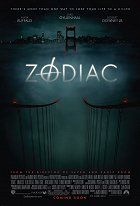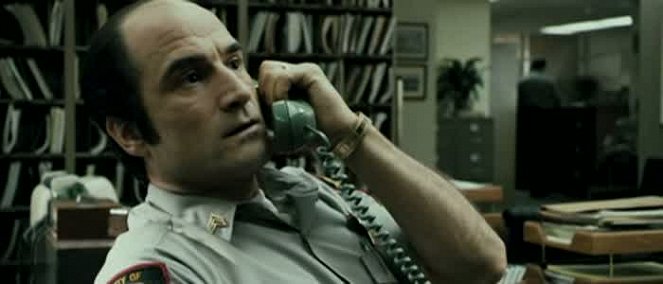Directed by:
David FincherScreenplay:
James VanderbiltCinematography:
Harris SavidesComposer:
David ShireCast:
Jake Gyllenhaal, Mark Ruffalo, Anthony Edwards, Robert Downey Jr., Brian Cox, John Carroll Lynch, Richmond Arquette, Chloë Sevigny, John Getz, John Terry (more)VOD (5)
Plots(1)
As a serial killer terrifies the San Francisco Bay Area and taunts police with his ciphers and letters, investigators in four jurisdictions search for the murderer. The case will become an obsession for four men as their lives and careers are built and destroyed by the endless trail of clues. (official distributor synopsis)
Videos (3)
Reviews (13)
While Fincher’s combination of hopelessness, cynicism and sadism has never been as well executed in every respect as it is in Zodiac, this is an engaging revelation of why there is no revelation. The scene of following a taxi with a god’s-eye view could be emblematic of the director’s reserved approach to the characters. He doesn’t let them live their own lives and prevents us from getting to know them better by constantly changing perspectives (the narrative stays with whoever has access to new information at the given time. Whether they find themselves in the field, at home or at a bar, whether at Christmas or on an ordinary day, they are dealing with the Zodiac killer. Paradoxically, however, if anything in the film undergoes obvious development, it is not the investigation, but the characters, who lose their nerve, enthusiasm and sense of detachment. Zodiac is most reminiscent of All the President’s Men, another factographic procedural thriller, not only in the characters’ obsession with uncovering the truth, but also in the style of the film itself. The architecture of the San Francisco Chronicle newsroom, the extraordinary depth of the extremely long shots (and the thought processes reflected in their completeness), the predominantly static camera and the exhausting collection and analysis of information are all reminiscent of Pakula’s film (and many other dramas and thrillers from the late 1960s and early 1970s), which ultimately convinces us that the system works, despite a similar course of development. Though Zodiac uses precise information about the time and place to promise us an essential revelation that will fundamentally influence the course of the investigation, this actually only leads us up another blind alley and is a manifestation of the director’s obsession with details (including making sure that what is played on the radio on a particular day and time is exactly what people would have actually heard on the radio at the time). At other times in Fincher’s neo-noir rendering, the sunny city of flower children becomes a dark labyrinth from which there is no way out and in which chaos reigns, which even murders that don’t fit any pattern correspond to. Instead of blue-green filters, the visually cohesive film is dominated by shades of yellow, the colour of obsession. Together with the interest in conveying information (see the prologue showing the journey of the letter), obsession is the leitmotif of the film. The importance of the media’s reporting of information and the necessity of going over an incredible amount of data again and again (in the conclusion, Graysmith essentially re-investigates what was investigated in the first two-thirds of the film) brings the faithful reconstruction of the forty-year-old investigation into the informationally oversaturated and media-controlled present. Zodiac is timeless also thanks to its stylistic reservedness. Fincher doesn’t try to be cool at any cost this time, as he uses complicated camera movements and CGI crutches only sparingly and focuses the most attention on the characters and what they communicate. In analysing the Zodiac mythology, the perfectionist director thus demonstrates devotion to the facts similar to that of his protagonists. Zodiac is an admirable and challenging film that is worthy of multiple viewings. 90%
()
(less)
(more)
A fascinating deconstruction of a procedural detective investigation that manipulates with the expectations of the viewer in the same way the “elusive” killer plays with the characters. Fincher is again very impersonal, using the heroes like moving filters of information that shift the attention of the viewer whenever there is some clear progress, only to negate it a moment later and subject them to further filtering. As with all his other films, in Zodiac Fincher does not dwell on redundant scenes to generate atmosphere (perhaps only when they follow the taxi, which represents the overall detachment), but drops one morsel of information after another and confidently alternates the chronological space-time, but does it in a spirit of continuity so, despite omitting those redundant scenes and thanks to the clarifying titles, we always know who is acting, why and where (usually speaking). The first act takes place largely in a newsroom and is more or less focused on a killer who provides limited clues, but it gradually goes on to alternate between the investigators Toschi and Graysmith, who drastically narrow the circle of suspects, repeatedly giving the impression that they are about to catch the perpetrator, while the viewer becomes concerned about the case-obsessed characters who receive personal letters or anonymous calls from Zodiac. By the end, the only investigator remaining is caricaturist and innocent boy-scout Graysmith, whose obsession has become almost paranoia, which the viewer also feels thanks to the growing frustration and the constant rewrite of the evidence, therefore perfectly covering Fincher’s depressive clash of good vs evil and increasing the tension, culminating in the scene in the cellar, where you can hardly catch your breath (because the suspect can now be basically anyone). What’s more, the ending doesn’t release the viewer, it leaves them with more questions than answers, something both the viewer and the characters have been struggling with throughout the story. Zodiac is an uncompromising alternative to the detective genre that refuses to provide satisfaction and whose antagonist inflicts blows not only to his victims, but also to the system as a whole and to everyone moving within it who watches the news, reads newspapers and listens to the radio (three media that are an important element of communication). A masterfully directed and acted two and a half hour long delight for cinephiles. 95%
()
Not nearly as progressive and daring as one would expect from the David Fincher. After several visually brilliant downers, he puts us to sleep in a perfectly balanced and “cinematic” film about a mass murderer, where there are very few murders, but a lot of talking, and just the right amount of atmosphere. The plot is linear and not at all complicated, which is truly a miracle, because with similarly executed films, you usually lose track of the names appearing on the screen after just a few minutes due to the director’s incompetence. But here it's different, everything is clear, we know what is happening, we know how it's happening, we just don't know who the real killer is. Several scenes are expertly escalated and fantastically performed, but several shots are like an eyesore (incredibly obvious and awkwardly styled digital shots of the city, inappropriate to the atmosphere of the 1970s). And so the film essentially just mumbles, and the viewer goes on their way. It's a nice watch, but too long and not dynamic enough. It certainly can't be considered a textbook film.
()
I tip my hat. David Fincher proves once again that he is one of the best. I haven't seen such an atmospheric crime detective story since Se7en. Great directing, excellent acting and an outstanding screenplay make Zodiac one of the best films of the year. An EXCELLENT soundtrack, by the way. And I'm not huge a fan of '70s music.
()
It’s long, but not long-winded. There are conversations, but it’s not chatty. Fincher is a genius at letting actors stand in front of the camera for two and a half hours and talk about a single subject. However, without a single directorial excess, with only the stylish atmosphere of the 1960s - 1980s span and a very austere Zodiac rampage, the film keeps a steady pace throughout the runtime, and the viewer eventually gets the feeling that the biggest action consists of copying ciphered letters or writing Graysmith's book. Given his previous work, this is a 180° turn, and yet it proves all the more that Fincher's range of skills still offers (especially in the future) many pleasant surprises for the audience.
()


